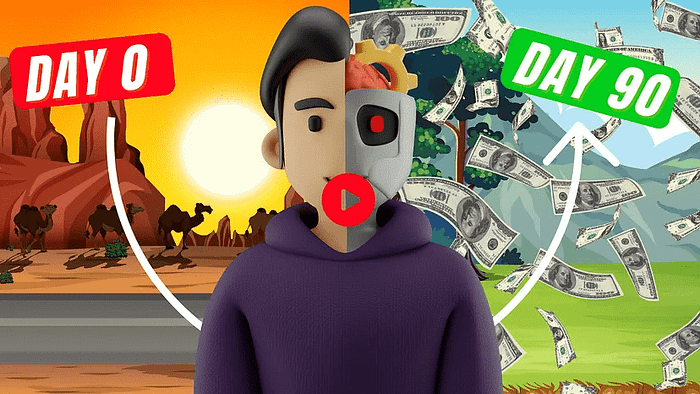Leading enterprises such as Google, IBM, and Airbnb are harnessing the power of AI tools for marketing to secure a competitive advantage. This article highlights the most impactful AI marketing tools available, offering insights into their applications and benefits.
The landscape of marketing has undergone a transformative shift with the advent of AI technologies. The proliferation of AI tools for marketing has made it challenging to discern which ones offer the greatest value.
Focusing on your specific needs is crucial when selecting an AI marketing tool. Let’s begin by understanding the role of AI in marketing and how it can benefit your business.
We strongly recommend that you check out our guide on how to take advantage of AI in today’s passive income economy.
Table of Contents
What Role Does AI Play in Marketing?
In 2024, marketing revolves around data analytics, encompassing competitor analysis, market trends, and customer feedback. Manually processing this data is daunting. AI simplifies these tasks, enabling swift and scalable data analysis.
AI applications in marketing range from sentiment analysis and competitor intelligence to enhancing marketing campaign ROI through precise targeting. AI-driven platforms can also generate creative content, addressing the continuous demand for fresh, SEO-optimized content.
While multiple AI-powered solutions are likely to be part of your toolkit, most data manipulation tools now integrate machine learning and automation to deliver scalable results. This guide delves into various AI-driven apps and platforms, detailing their functionalities, advantages, and potential limitations.
Now, let’s explore each tool in more detail.
1. Jasper AI (for copywriting)
Jasper AI has emerged as a leading solution among AI-powered copywriting tools, quickly amassing over 350,000 users. Originally named Jarvis, Jasper had to rebrand following a legal notice from Marvel. Despite this, Jasper excels at producing diverse copy across various topics and styles. Although it requires human refinement for optimal flow and to avoid repetition, Jasper serves as an effective tool for drafting content that can be polished by human editors.
2. Lexica Art (for blog thumbnails)
Lexica Art distinguishes itself as a premier AI image generator, ideal for creating marketing content including blog thumbnails. Its ability to generate brand-aligned images makes it a valuable asset for enhancing blog visual appeal beyond standard stock photos.
3. Surfer SEO (for content writing)
Surfer SEO optimizes content for search engine rankings, providing actionable insights for keyword density, structure, and other SEO factors. It integrates with other content marketing tools, aiding in the creation of content that excels in search engine performance.
4. Notion AI (for productivity)
Notion AI enhances the popular productivity platform by answering queries and assisting with content creation, leveraging AI to streamline project management tasks. It offers a tiered pricing model and emphasizes data security and privacy compliance.
5. Content at Scale (for generating SEO blog posts)
Content at Scale stands out for its ability to produce AI-generated content that passes as human-written, offering a robust solution for SEO blog post creation. Despite its UI challenges, its content quality surpasses many alternatives.
6. Originality AI (for AI content detection)
Originality AI serves as a reliable tool for detecting AI-generated content, ensuring content authenticity. It’s particularly useful for verifying the human quality of content produced by AI tools or freelance writers.
7. Writer.com (content writing for teams)
Writer.com enhances team content creation with features like autocorrect, autocomplete, and style adherence, making it a valuable tool for maintaining consistency across team-produced content.
8. Undetectable AI (for rewriting AI content)
Undetectable AI rewrites AI-generated content to improve its human likeness, offering a solution for making AI content more authentic. However, it requires careful review to ensure accuracy and grammatical correctness.
9. FullStory (for digital experiences)
FullStory analyzes user interactions on websites to improve digital experiences, leveraging AI to identify insights and opportunities for UX enhancement.
10. Zapier (for automating tasks)
Zapier facilitates the automation of marketing tasks by connecting various systems and processes, allowing for the creation of efficient workflows without coding expertise.
11. Hemingway App (for content editing)
The Hemingway App improves content readability by identifying complex sentences and suggesting stylistic improvements, though it may oversimplify content intended for more sophisticated audiences.
12. Chatfuel (for chatbots)
Chatfuel enables the creation of customized chatbots, enhancing customer interaction and engagement through intelligent response to user inquiries.
13. Grammarly (for content editing)
Grammarly offers comprehensive content editing, focusing on grammar, punctuation, and style improvements to enhance content quality across various platforms.
14. Albert.ai (for digital advertising)
Albert.ai optimizes digital advertising campaigns through data-driven personalization, significantly increasing campaign relevance and efficiency.
15. Headlime (for landing pages)
Headlime specializes in creating compelling landing page content, utilizing GPT-3 to generate text that enhances page engagement and conversion rates.
16. Userbot.ai (for conversation management)
Userbot.ai combines AI with human oversight for conversation management, learning from interactions to improve future responses and enhance customer service.
17. Browse AI (for scraping web pages)
Browse AI automates data collection from competitor websites, providing valuable insights for competitive intelligence and market analysis.
18. Algolia (for search and recommendation APIs)
Algolia enhances website search functionality, offering customized search experiences that improve customer satisfaction and conversion rates.
19. PhotoRoom (for removing image backgrounds)
PhotoRoom uses AI to remove photo backgrounds, streamlining the creation of professional-looking images for various marketing purposes.
20. Reply.io’s AI Sales Email Assistant (for email replies)
Reply.io automates email marketing campaigns, employing AI to optimize engagement and identify promising leads through response scoring.
21. Brand24 (for media monitoring)
Brand24 aggregates brand mentions across digital platforms, applying sentiment analysis to gauge public perception and respond to customer feedback effectively.
22. Influencity (for influencer marketing)
Influencity facilitates influencer marketing campaigns, offering comprehensive tools for assessing and collaborating with influencers to maximize campaign impact.
The Enduring Impact of AI tools for Marketing
AI tools for marketing are transforming the industry, offering scalability, efficiency, and enhanced decision-making capabilities. As AI technology continues to evolve, marketers have access to an unprecedented array of tools to drive success. With many of these tools offering freemium versions, exploring their potential can significantly benefit your marketing strategy AI tools for marketing is the future.

We strongly recommend that you check out our guide on how to take advantage of AI in today’s passive income economy.




